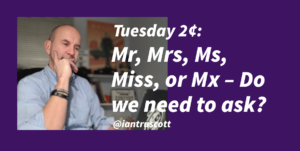In this week’s Tuesday 2¢ I ponder what we really need to know about our audience and consumers in order to improve our usefulness and relevance to them and their customer experience.
United Continental airlines recently made a small fuss out of adding an additional value in its drop down fields. You can now describe yourself as gender neutral – as an “Mx”.
I agree this is a progressive step, a topic we need to address as a society and any movement in this direction is positive. If I’m cynical it’s certainly wonderful PR to align with the zeitgeist. But, in either case, when I read this announcement, I wondered why it really matters.
Why does an airline need to put us in a sub group managed by a drop-down value, why do they need to know if you are a Mr, Mrs, Ms, Mx?
I don’t mean this as a political statement, I mean from a practical perspective of how is the marketing and the service is going to change through classifying an audience in this way.
Sure, I understand there is a level of politeness in the way we are addressed, depending on the culture we live and our customs. So, let’s be generous and suggest United need this information as they want to personalize their flying experience and welcome a gender-neutral passenger onto an airplane.
I kinda doubt it’s the motivation, as how many of their customers get addressed as Mr/Mrs/Mss/Dr now (and how do you pronounce Mx?), I suspect they ask for a title simply because they always have.
What we call each other is a bigger question for society, along with the pronouns we use, but if providing a personalized version of their service is the objective of knowing someone’s title, wouldn’t it be simpler just to ask people want they want to be called?
I don’t need to be called “Mr Truscott”, if I was sat on a Lufthansa plane (my second home for the last two years as I commuted to Germany) I’d probably be delighted if they called me “Ian”, if I was allowed to express a preference.
Maybe it’s for security reasons and the integration into the passport and security systems of the world, presuming, of course that they have all universally adopted “Mx”? I don’t think so, the Dutch have sort of done this with their passports, but that’s about your sex (M/F/X) not about a salutation.
So… if there isn’t a practical reason to know this person likes the title of Mx, Mr, Ms, “Ian” or “Grand High Mufti” – what would I do with that information?
Is the customer experience going to change for someone that selects “Mx” rather than someone that wants to be called “Ian”? Is the seat, food or on-boarding process different? Are the consumers’ needs different? Do we behave differently when selecting a flight?
If we need the information, technically, it can’t be that hard to give us a drop down of suggestions and then have a free text field for people that have a different opinion
Yes, you’ll get a bunch of silly buggers that take the piss, wanting to be called Ninja, PassengerMcPassengerFace or Starfleet Captain, but why not? If that’s what they want the postman to see on their direct mail, then so be it.
It feels to me like an antiquated system with a form that that has always had a fixed set of values for title or salutation since the system munched away on punched cards and whirling magnetic tapes, and to solve this “problem” of societal change they add another value to a field that has existed for 50 years, rather than ask why or change anything.
Maybe this is relevant to United Airlines and their audience, I just haven’t figured it out, however reading this made me think about the data we collect as marketers. We need to focus on just the actionable data that we ask our consumers for and ask:
Why do we need to know this?
Does this help our marketing be more useful or relevant to them?
Will this change the service we provide to them?
If we can’t answer these questions, we shouldn’t ask.
Fancy more of this?
Subscribe to my Rockstar CMO Newsletter

I’m a 3xCMO, now a marketing strategy advisor and podcast host at Rockstar CMO. Although, I’m not a rock star, but a marketing leader, strategist, content marketer, columnist, speaker, industry watcher, and creator of ART (Awareness, Revenue, and Trust) for the companies I work with. But most of all, I am an enthusiastic tea drinker.
You can find me on LinkedIn, Twitter, or now Threads! – or listen to my weekly podcast at Rockstarcmo.com
The half-baked thoughts shared on this blog may not reflect those of my employer or clients, and if the topic of this article is interesting or you just want to say hello please get in touch.
